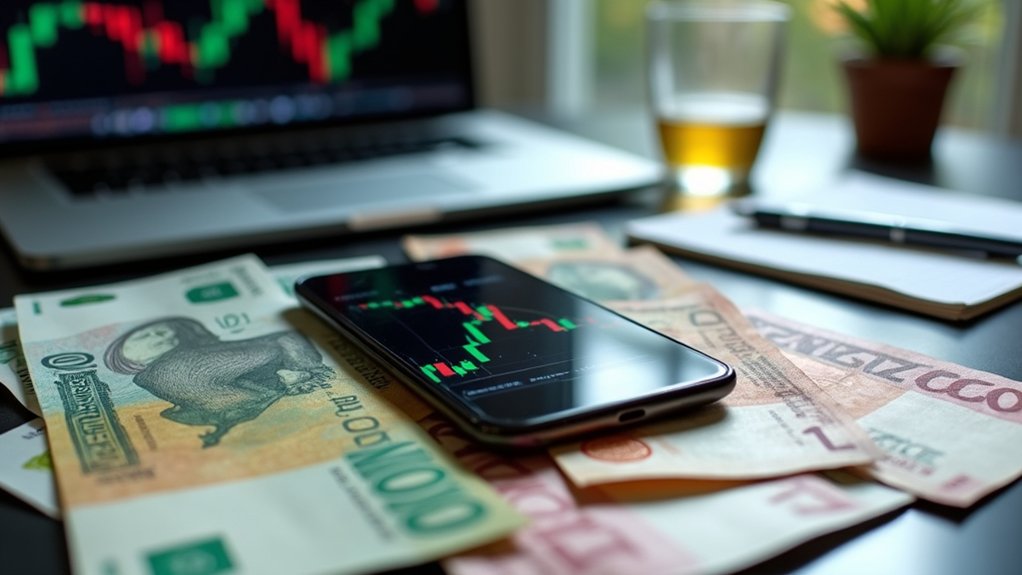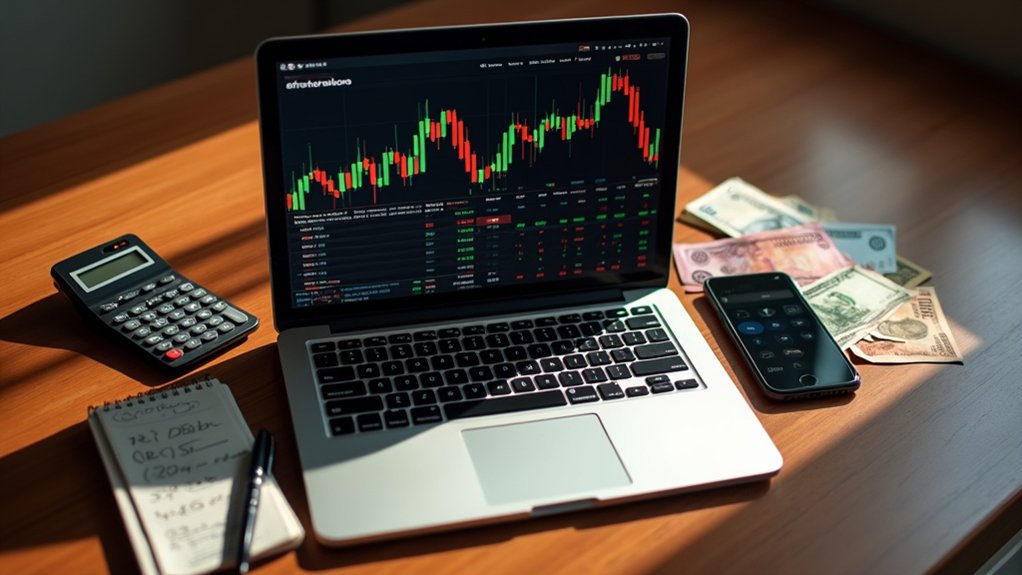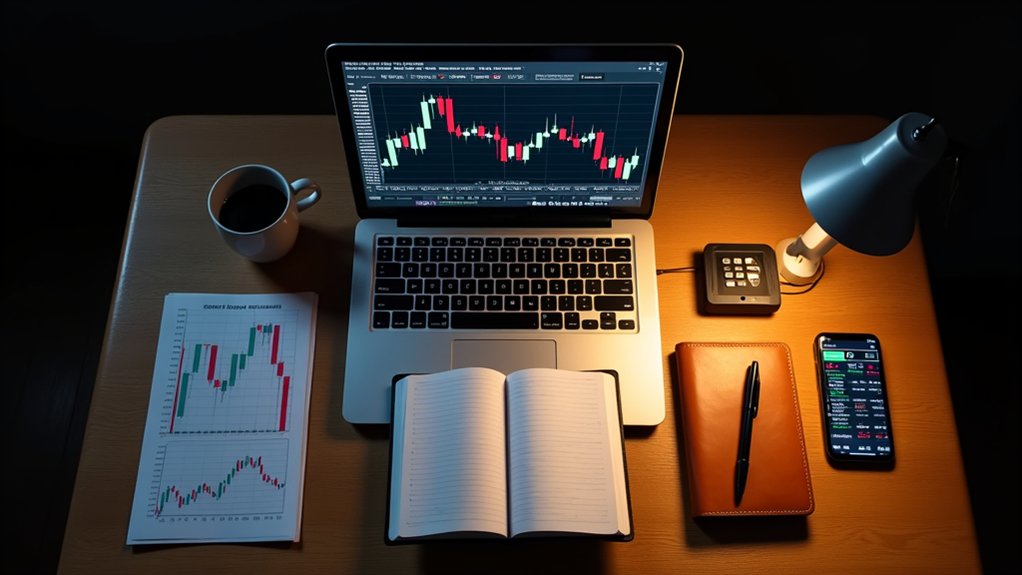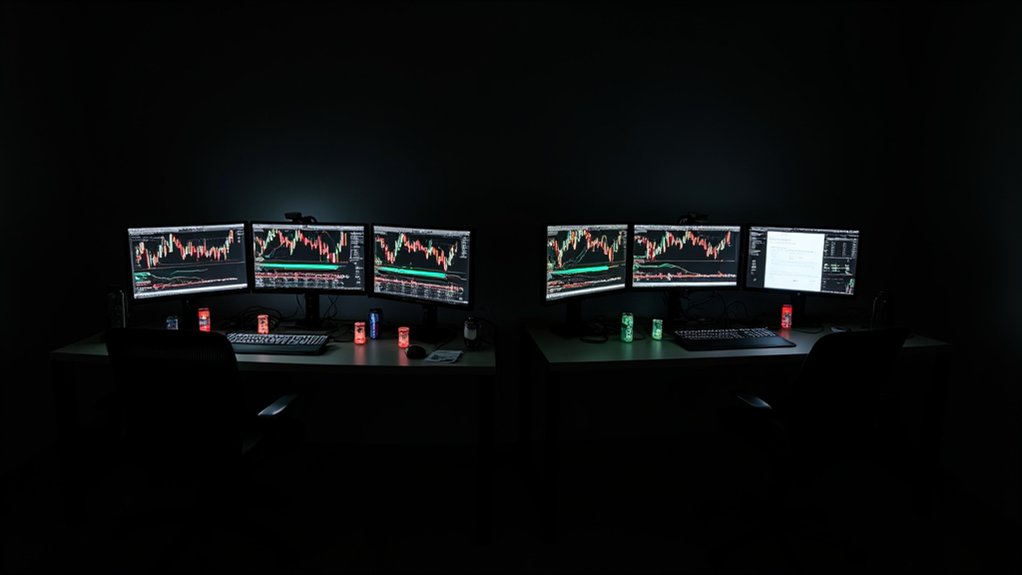Currency appreciation happens when one unit buys more foreign currency than before—stronger purchasing power, plain and simple. Depreciation is the opposite: that same unit now buys less foreign currency, making everything abroad pricier. Strong economies, higher interest rates, and political stability typically drive appreciation. Weak growth, low rates, and instability trigger depreciation. These movements reshape import costs, export competitiveness, and inflation rates. The forces behind these shifts—from central bank decisions to market sentiment—determine whether currencies sink or soar.

Every single day, traders across Nigeria, Kenya, South Africa, and dozens of other African nations watch currency values swing up and down on their trading screens. Those movements have names: appreciation and depreciation. Understanding the difference isn't optional for anyone serious about forex trading in Africa.
For serious African forex traders, knowing appreciation from depreciation isn't optional—it's survival.
Currency appreciation happens when one unit of a currency increases in value relative to another currency in the foreign exchange market. Simple enough. When the South African rand appreciates against the US dollar, one rand buys more dollars than it could before. An appreciating currency means exactly that—more purchasing power. The British pound appreciating against the dollar? One pound suddenly buys more dollars. Currency appreciation typically results from increased demand for that particular currency in the forex market.
Currency depreciation is the opposite. It refers to a decrease in value relative to other currencies. When a currency depreciates, one unit purchases less of another currency than it did previously. If the Kenyan shilling depreciates against the euro, that shilling now buys fewer euros. Depreciation occurs when more units of domestic currency are required to buy the same amount of foreign currency. The domestic money loses its purchasing power against other currencies. Not complicated.
So what causes these movements? Strong economic performance typically drives demand and appreciation. Higher interest rates attract foreign investment and increase demand for the currency, leading to appreciation. Monetary policy decisions from central banks regarding interest rates are among the most influential factors driving exchange rate fluctuations in the forex market. Political stability creates confidence. Higher demand for exports increases demand for currency. Rising commodity prices can drive currency appreciation for commodity-exporting nations—think Angola with oil or Botswana with diamonds. Market sentiment and investor confidence also play crucial roles in determining whether currencies strengthen or weaken.
Depreciation? Lower interest rates reduce foreign investment demand. Weak economic performance decreases confidence. Political instability drives down currency values. Trade deficits, when imports exceed exports, can lead to depreciation. Sometimes central bank policies intentionally weaken currency. It happens. A country's inflation rate directly impacts its currency value because higher inflation erodes purchasing power and typically leads to currency depreciation in forex markets.
The impact on international trade matters for African economies. Currency appreciation makes imports cheaper for domestic consumers. They can purchase more foreign goods with the same amount of domestic currency. But appreciating currencies make exports more expensive for foreign buyers, potentially reducing international demand. Currency depreciation makes imports more expensive because domestic currency buys fewer foreign goods. Depreciating currencies make exports cheaper for foreign buyers, potentially boosting export sales and reducing trade deficits. When depreciation drives up prices for imported inputs like crude oil, it triggers imported inflation that pushes up transport and production costs across the economy. Exchange rate movements directly affect trade balances between countries by altering the relative prices of goods. For traders in Ghana, Zambia, or Egypt watching these movements, the implications are real and immediate.
These constant fluctuations create challenges because currency volatility makes planning and budgeting difficult for businesses operating across borders. Central banks across the continent frequently use interest rate adjustments to manage currency movements and maintain economic stability. Central bank interventions in foreign exchange markets can directly influence currency values by buying or selling currencies to stabilize exchange rates during periods of excessive volatility.
Common Questions
How Does Currency Depreciation Affect Remittances Sent Home to African Countries?
Currency depreciation pumps up the local value of remittances—recipients in Nigeria, Egypt, or Ghana get more naira, pounds, or cedis per dollar sent.
Sounds great, right? Not quite. Inflation usually tags along, eating away purchasing power faster than the extra cash can help.
Families still struggle with soaring food and utility costs.
Some migrants send more money to compensate, but high transfer fees—averaging 7.9% in Sub-Saharan Africa—make that painful.
The boost is mostly an illusion.
Which African Currencies Have Depreciated Most Against the Dollar Recently?
The Nigerian naira, Malawian kwacha, Ghanaian cedi, Burundian franc, and Malagasy ariary have taken brutal hits recently.
Nigeria's naira crashed over 30% since early 2024, now above ₦1,500 per dollar. Malawi's kwacha? Nearly 40% gone in twelve months, passing MWK1,700. Ghana's cedi slid to 10.90 in August 2025. Burundi's franc dropped 5–6%, breaching BIF2,900. Madagascar's ariary fell roughly 6% to MGA4,700. Inflation, forex shortages, and import dependence crushed them all.
Can Nigerian Traders Profit When the Naira Depreciates Against Other Currencies?
Yes, Nigerian traders can profit—if they play it right.
Export businesses win big when the naira tanks, since their goods get cheaper abroad. Cocoa exports jumped 12% after the 2020 devaluation. Forex speculators also cash in by buying dollars and watching them rise against the weakening naira. Hedging strategies work for those who understand them.
But here's the catch: import-dependent traders get crushed by rising costs, and inflation eats away real gains fast.
Do South African Brokers Offer Protection Against Sudden Currency Appreciation Losses?
No. South African brokers don't offer protection against currency appreciation losses—that's not what regulatory safeguards are for.
The FSCA requires brokers to segregate client funds and maintain capital buffers, sure. Many offer negative balance protection so traders can't lose *more* than their deposit during wild volatility. But protecting against the Rand suddenly strengthening? That's pure market risk. Brokers aren't insurers. Traders manage appreciation risk themselves—stop-losses, hedging, or just accepting the gamble.
How Does Egypt's Pound Depreciation Impact Local Forex Trading Account Balances?
When the Egyptian pound tanks, local traders get squeezed hard. EGP account balances lose dollar value even if the nominal number stays put. Margin calls hit faster because more pounds are needed to cover USD trades. Sure, profits from foreign currency trades look bigger in EGP terms—but that's just inflation theater. Those “gains” buy less internationally.
Meanwhile, brokers often tighten leverage during sharp drops, and swaps plus spreads can spike. Egypt's 2025 record lows made this painfully real for local accounts.











